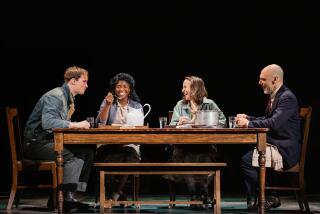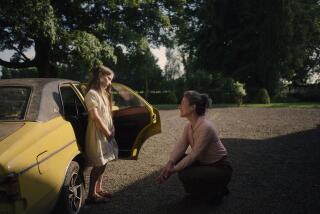FICTION
- Share via
THE COUNTRY GIRLS TRILOGY AND EPILOGUE by Edna O’Brien (Farrar, Straus & Giroux: $18.95). With this trilogy, Edna O’Brien unveils essence of Irish. The top note is witty and mellifluous, the base weighted down with despair. The blend gets its bite from sarcasm. But the lingering mood is melancholy. These are O’Brien’s three earliest novels--the first, “The Country Girls,” was published in 1960. She completes the collection with a new epilogue.
We follow her girls, Kate and Baba, from childhood in rural Ireland, through working-girl days in London (“The Lonely Girl”), on to disillusioning courtships and marriage (“Girls in Their Married Bliss”) to an end of tragic disloyalty. Along the way, we see timorous Kate knuckle under to her drunkard father in the name of filial piety. And we meet Baba, whose well-to-do father indulges her willfulness. We hear the story of Kate’s lost mother--drowned in a lake when Kate was a little girl. With her sentimental spirit and her unkempt kitchen, she’s a contrast to Baba’s mother, who quietly manages an orderly house.
When Kate wins a scholarship to a Catholic girls’ boarding school, we go with her, and her imperious pal, to a joyless world governed by nuns. (No talking, no laughing, no treats. No mercy. The two girls are expelled for writing a note about a priest’s privates.) At this early age, Kate has already set an unhappy precedent. She has formed an attachment to a married man. He is the first of several to appear in these stories and play on her penchant for disappointment in love. Kate falls in love with Eugene, who is married to someone else, though they live apart. Her father brands it adultery, drags her home to the farm and calls the local priest. When she escapes, she takes along her Catholic guilt and her fear of eternal damnation. Meanwhile, Baba plays the romantic field, mismanages her health, contracts consumption and spends time in a sanitarium. Kate goes to live with Eugene.
To tell the black-humored tale of their marital “bliss,” O’Brien lets Baba do the talking. She shows us relationships rife with miscommunication and disrespect. She turns the tone to crudeness, shifts the humor from wry to bawdy. But her subject matter--love and loss and loneliness--is the same. It’s a difficult trip, this coming of age. Two girls set adrift, misdirected, lost at sea. O’Brien tells it with love and outrage, compassion and contempt. And in the telling, she sheds new light on Auden’s observation about Yeats: “Mad Ireland hurt you into poetry.”
More to Read
Sign up for our Book Club newsletter
Get the latest news, events and more from the Los Angeles Times Book Club, and help us get L.A. reading and talking.
You may occasionally receive promotional content from the Los Angeles Times.







